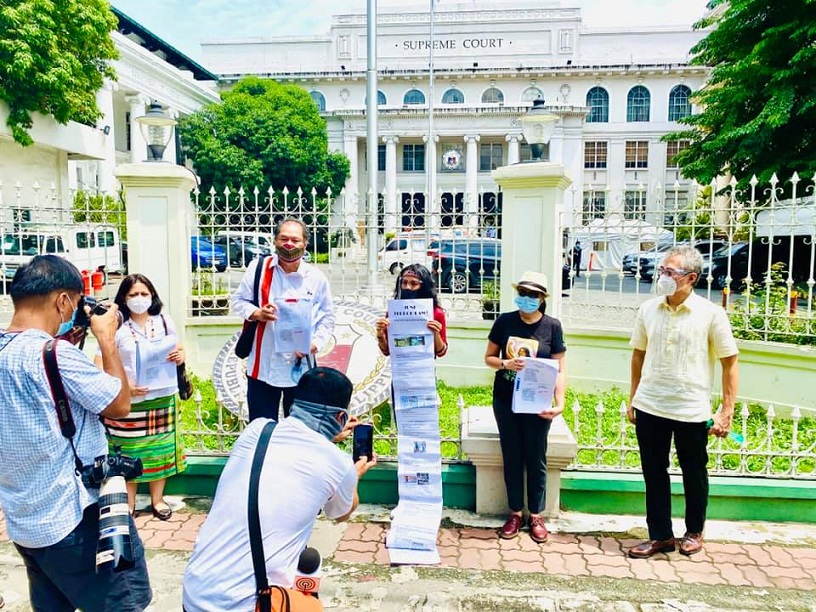
Indigenous Peoples and Moro organizations led by lawyer Antonio
La Viña file a petition to declare the
Anti-Terror Act “unconstitutional.” Photo from La Viña’s FB page.
Local Indigenous Peoples (IPs) gained support from a global organization in their fight for the nullification of the recently enacted anti-terror law.
The Indigenous Peoples Rights International (IPRI) pledged in a statement that it will “work together with indigenous organizations and advocates” in the fight against the “draconian law,” referring to Republic Act (RA) No. 11479 or the Anti-Terrorism Act (ATA) of 2020. IPRI is a global organization championing indigenous rights.
“As a global indigenous organization, IPRI commits to stand with Indigenous Peoples’ fight for justice, no matter how challenging it may be. The Philippine Anti-Terrorism Act serves as a legal weapon by the state to warrant further attacks to defenders of rights, lands and the environment,” said Joan Carling, co-convenor of Indigenous Peoples’ Major Group (IPMG) for Sustainable Development.
IPs and Moro organizations questioned the constitutionality of RA 11479 before the Supreme Court on Aug. 7 by filing a petition for certiorari and prohibition. It was the 24th out of almost 30 petitions filed against the anti-terrorism law at the High Tribunal.
The petitioners raised concern that the “vague and arbitrary definitions of terror crimes” under the new law may be used against indigenous peoples as well as advocates of indigenous rights. Among the groups represented in the petition were Ako-Bakwit, Kalumbay Regional Lumad Organization, Kalipunan ng Katutubong Mamamayan ng Pilipinas (Katribu), SANDUGO (Alliance and Movement of Bangsamoro and Indigenous Peoples and for Self-Determination), Save Our Schools Network, LILAK/Purple Action for Indigenous Women’s Rights Inc. Samira Gutoc-Tomawis, an advocate of women’s rights and a former local legislator, led the individual petitioners.
Carling assured the IP groups of its support in efforts “to promote the respect and realization of Indigenous Peoples rights as well as access to justice.”
Attacks on IPs prior to anti-terror law
IPRI noted in its statement that prior to the passage of the ATA, “the Philippine government under (President Rodrigo) Duterte’s administration drew flak for red-tagging activists, including indigenous rights defenders as terrorists.”

Online forum on Indigenous People: Lumad School teacher
Jeany Rose Hayahay; Human Rights Commissioner Gwendolyn Gana; activist lawyer Antonio
La Viña.
In a forum conducted by IPRI on Monday, Aug. 10, Jeany Rose Hayahay, an indigenous leader and volunteer teacher at Lumad schools in Mindanao, shared that even before the enactment of the ATA, Lumad schools and IPs in Mindanao have been experiencing threats and attacks such as false accusations on Lumad leaders and bombings, among others.
Hayahay cited a report from Save Our Schools (SOS) Network, an organization advocating IP’s rights to education, showing 1,030 incidents of attacks on schools when Mindanao was under martial law.
Duterte placed the entire Mindanao under martial law in May 2017 following the siege of Marawi City in Lanao del Sur by terrorists from the Islamic State (ISIS)-affiliate Maute group. Martial law was lifted two and a half years later in December 2019.
IP groups and defenders of their rights have expressed fears that the enforcement of the anti-terrorism law could worsen the situation.
“Lumad communities have been rendered vulnerable due to the pandemic, and they continue to face militarization and displacement,” a statement from the SOS Network read.
According to Hayahay, 176 Lumad schools were forcibly closed as of May 2020. She lamented that the government’s apparent priority is not to contain the coronavirus disease (COVID-19), “but to silence its critics.”
The 2020 midyear report from IPRI showed the Philippines topping the list of 23 countries with documented incidents of violations of civil and political rights.
The Philippines was recorded to have 32 trumped-up charges and incidents of illegal arrests, detentions, and abductions, among other atrocities against IPs in the country. These incidents involved 125 individuals, three IP communities and six villages.
Bangladesh came in second with 13 recorded incidents, followed by Canada with 8 “criminalization incidents.”
IPRI also reported that the Philippines ranked second among countries with violations of economic and socio-cultural rights, affecting 700 individuals, 937 families and one village involving incidents of land grabbing and displacement. Bangladesh topped the list, with four incidents affecting 5,000 individuals and three communities.
The IPRI covered 23 countries worldwide and documented 202 incidents of human rights violations from Jan. 1 to July 31. More than half of the incidents were attacks on fundamental rights and freedoms of IPs.
According to the report, “many of these states are implementing restrictive measures using these to take advantage of the pandemic in attacking indigenous leaders and communities and in taking over their lands and resources.”
They categorized criminalization and violence into four: killings, violations of civil and political rights, violations of economic and socio-cultural rights, and gender-based violence.
In view of the incidents affecting the IPs prior to the enactment of the anti-terrorism law, Rep. Eufemia Cullamat of Bayan Muna party-list said the situation could get worse. Cullamat is a Manobo from Surigao del Sur.
She said that instead of getting assistance from the government, the IPs have been receiving threats and attacks from the military amid the coronavirus disease (COVID-19) pandemic. She said complaints on these could be used against them under RA 11479 and its restrictive provisions.
Floodgates to abuse
Fears of abuse by authorities under the anti-terrorism law have been coming not only from the indigenous peoples but also from a member of the Commission on Human Rights (CHR), an independent constitutional body tasked to investigate all forms of human rights violations involving civil and political rights in the country.
Lawyer Gwendolyn Pimental-Gana, CHR’s focal commissioner for the IPs, said the anti-terror law “gives law enforcers wide and unbridled discretion to interpret the provisions of the law, and, as a consequence, open floodgates to abuse and misuse of the law to target dissenters, critics of the government, civil society organizations, human rights defenders, journalist, minority groups, labor activists, and indigenous peoples.”
Pimentel-Gana cited that among the major flaws of the ATL “lie in the broad and vague definition of terrorism.”
She said the comparison of the definition of terrorism with that in the Human Security Act of 2007, “readily reveals the vagueness of the definition in the ATL of terrorism.”
She also cited that terrorism acts constitute crimes clearly defined under the Revised Penal Code and other laws.
Further, she said that the ATA affects several human rights and fundamental freedoms of the IPs, as enshrined in the 1987 Constitution and the United Nations Declaration on the Rights of Indigenous Peoples (UNDRIP).
UNDRIP’s article 1 states that “indigenous peoples have the right to full enjoyment, as a collective or as individuals, of all human rights and fundamental freedoms as recognized in the Charter of the United Nations, the Universal Declaration of Human Rights and international human rights law.
The Philippine is one of the countries that adopted UNDRIP which, incidentally, will celebrate its 13th anniversary of adoption by the UN General Assembly on Sept. 13.
“The exercise of these human rights and freedoms are important means to assert and protect the other rights, like the right to land and territories, the right to self-determination, the right to self-governance, and the right to enjoy and practice their culture, customs, religions and languages,” Pimentel-Gana said.
She said that under the ATA, the assertion of the IPs of the right to free, prior and informed consent (IFPC) and the right to autonomy or self-government, “may qualify as acts of terrorism.”
The rights lawyer said that effective counter-terrorism measures should not suppress IP rights but should be “additional mechanisms that help promote and protect rights to lands and territories, to self determination, to self-governance and to enjoy and practice cultures and customs, religions, and languages, and other rights.”
Given these circumstances, Cullamat said she believes the national minorities must speak up against the anti-terrorism law.
“We should oppose (the anti-terror act) because it has not given us any good, especially to the IPs, she said in Filipino.
This reflects the call of Hayahay in her speech: “We call for the junking of the Anti-Terror Law. We fought before and we’re still here. We will keep fighting.”
